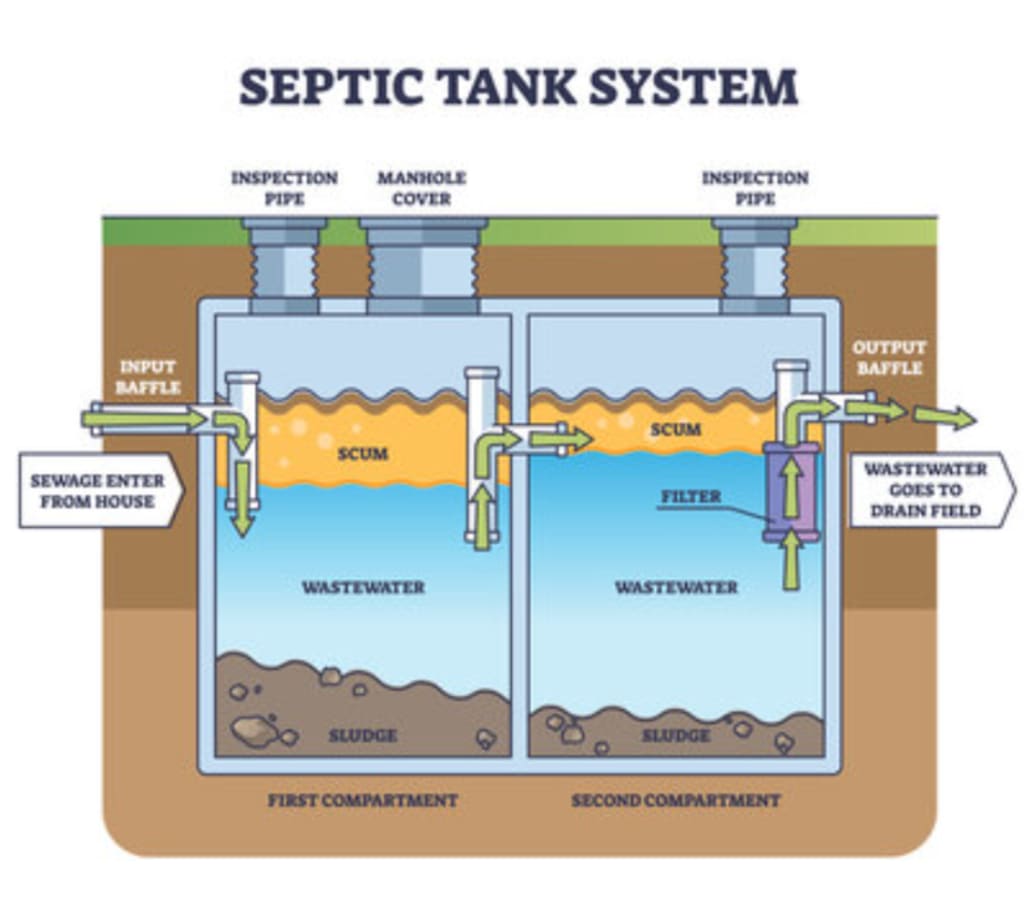Are Septic Tank Treatments Necessary?
Do You Treat Septic Tank Waste?

# Are Septic Tank Treatments Necessary?
Owning a home with a septic system brings a unique set of responsibilities, one of which is understanding how to maintain that system effectively. Among the myriad of maintenance practices, the question often arises: Are septic tank treatments necessary? The answer isn't as straightforward as a simple yes or no. It depends on various factors including the type of septic system, household habits, and environmental conditions. Let's dive deeper into the world of septic tank treatments to unravel whether they are a necessity or just a nice-to-have.
## Understanding Your Septic System
A septic system is a crucial part of homes not connected to municipal sewer systems. It consists of a septic tank, where waste is collected and separated into solids and liquids, and a drain field, where treated effluent is filtered into the soil. Over time, solids accumulate in the tank and need to be pumped out periodically to prevent system failure.
### What Are Septic Tank Treatments?
Septic tank treatments typically come in the form of additives—either biological or chemical—that are designed to enhance the decomposition of organic matter in the tank. These treatments can include:
- **Biological Additives**: These contain bacteria or enzymes that are supposed to boost the natural microbial activity in the septic tank, helping break down organic waste more efficiently.
- **Chemical Additives**: These usually consist of inorganic compounds that aim to break down solids or unclog the system. However, their use is controversial due to potential environmental impacts.
## Do You Really Need Them?
### The Case for Treatments
1. **Boosting Bacterial Activity**: Some argue that adding biological additives can replenish bacteria that may have been killed off by household products like bleach or antibacterial cleaners. This can be particularly beneficial for households that use a lot of these products.
2. **Preventive Maintenance**: Regular use of treatments is seen by some as a way to prevent clogs and backups by ensuring waste is broken down effectively. For those with older systems or higher-than-average usage, treatments can provide peace of mind.
3. **Environmental Protection**: A well-maintained septic system is less likely to fail and contaminate the surrounding environment. In areas where groundwater protection is critical, treatments might be viewed as an extra layer of safeguarding.
### The Case Against Treatments
1. **Natural Balance**: Many experts believe that a properly functioning septic system doesn’t need additional treatments. The natural bacteria present in human waste, combined with those already in the tank, are usually sufficient to break down the organic matter.
2. **Potential Harm**: Chemical additives, in particular, can disrupt the delicate balance of the tank’s ecosystem and potentially damage the drain field. They can also contribute to environmental pollution if not used properly.
3. **False Sense of Security**: Relying on treatments might lead homeowners to neglect other critical aspects of septic system maintenance, such as regular pumping and proper water usage. No additive can replace the need for periodic professional inspection and pumping.
### What the Experts Say
The Environmental Protection Agency (EPA) and many septic system professionals generally recommend caution with additives. They stress that the best way to maintain a septic system is through regular inspections and pumping, water conservation, and proper waste disposal practices.
## Making the Decision
When deciding whether to use septic tank treatments, consider these factors:
- **Age and Condition of Your System**: Older or less efficient systems might benefit more from treatments than newer, well-maintained systems.
- **Household Habits**: If your household uses a lot of chemical cleaners or has high water usage, treatments might help maintain the balance in your tank.
- **Professional Advice**: Consult with a septic system professional who can provide insights tailored to your specific situation. They can help you weigh the pros and cons based on your system's condition and local environmental considerations.
## Best Practices for Septic System Care
Regardless of whether you choose to use treatments, here are some universal best practices for maintaining a healthy septic system:
1. **Regular Pumping**: Have your septic tank inspected and pumped every 3-5 years, or as recommended by your professional based on usage and tank size.
2. **Mindful Water Use**: Reduce water usage to avoid overloading the system. Fix leaks and spread out laundry and dishwashing over several days.
3. **Proper Disposal**: Avoid flushing non-biodegradable items, fats, oils, and harsh chemicals down the drain.
4. **Protect the Drain Field**: Do not park vehicles or plant trees over the drain field to prevent damage and ensure proper filtration.
## Conclusion
Septic tank treatments can be beneficial in certain situations but are not universally necessary. The key to a well-functioning septic system lies in proper maintenance, responsible water usage, and regular professional inspections. By understanding your system and taking proactive steps, you can ensure its longevity and effectiveness without relying solely on treatments.
### Final Thought
While treatments might offer an additional layer of support for your septic system, they are no substitute for good maintenance practices. Weigh the pros and cons, consult with professionals, and make an informed decision that best suits your home's needs.
# Do You Treat Septic Tank Waste? Exploring the Journey from Tank to Treatment
When you flush your toilet or drain your sink, the waste disappears from view, but where does it go? For homes with septic systems, this waste ends up in a septic tank—a crucial but often overlooked component of wastewater management. Many homeowners wonder: do you need to treat septic tank waste, or does the tank handle everything on its own? Let’s explore the journey of septic tank waste, the treatment process, and what steps you should take to ensure your system functions efficiently and responsibly.
## The Role of a Septic Tank
A septic tank is a watertight container buried underground, typically made of concrete, fiberglass, or polyethylene. It serves as the first stage in treating household wastewater in areas not connected to municipal sewer systems. Here’s a brief overview of how a septic tank works:
1. **Separation of Waste**: As wastewater flows into the tank, heavier solids settle at the bottom, forming sludge, while lighter substances like oils and grease float to the top, creating a scum layer. The middle layer, relatively clear liquid, is known as effluent.
2. **Initial Treatment**: Natural bacteria in the tank break down some of the solid waste, reducing the volume of sludge and scum. However, this process is not complete and requires further treatment.
3. **Effluent Discharge**: The effluent flows from the tank into the drain field (or leach field), where it percolates through the soil. The soil acts as a natural filter, further treating the effluent before it reaches groundwater.
## Do You Need to Treat Septic Tank Waste?
While the septic tank itself handles the initial stages of waste treatment, there are several aspects to consider regarding additional treatment and maintenance:
### Regular Pumping: The Essential Treatment
One of the most critical treatments for septic tank waste is regular pumping. Over time, the sludge and scum layers build up and can reduce the tank’s efficiency or cause system failures. Regular pumping removes these accumulated solids, preventing overflow and ensuring the system works effectively. The general recommendation is to pump your tank every 3-5 years, but this can vary based on usage and tank size.
### Biological and Chemical Additives
Many products on the market claim to enhance septic system performance by adding bacteria or enzymes to break down waste more effectively. While these treatments can support the natural bacterial activity in the tank, they are not a substitute for regular pumping and proper maintenance. Moreover, some chemical additives can harm the system and the environment.
### Managing Household Waste
Properly managing what goes into your septic system is a form of treatment in itself. Here are some key practices:
- **Avoid Flushing Non-Biodegradable Items**: Items like wipes, diapers, and feminine hygiene products can clog the system.
- **Limit Use of Harsh Chemicals**: Products like bleach or drain cleaners can kill beneficial bacteria in the tank.
- **Reduce Water Usage**: High volumes of water can overload the system, reducing its effectiveness.
### Effluent Treatment in the Drain Field
After leaving the septic tank, the effluent undergoes further treatment in the drain field. Here, the soil acts as a natural filter, removing pathogens and impurities before the water re-enters the groundwater system. Maintaining a healthy drain field is crucial:
- **Prevent Soil Compaction**: Avoid driving or parking vehicles over the drain field.
- **Manage Vegetation**: Plant grass or shallow-rooted plants over the drain field, but avoid trees or shrubs that can damage pipes with their roots.
## Professional Inspections and Maintenance
While homeowners can manage some aspects of septic system care, professional inspections and maintenance are crucial. A certified septic service provider can:
- **Assess the System’s Condition**: Regular inspections can identify issues early, such as leaks, blockages, or improper tank size for your household’s needs.
- **Perform Necessary Repairs**: Professionals can handle repairs that require specialized knowledge or equipment.
- **Advise on System Upgrades**: For older systems or those not meeting current standards, professionals can recommend upgrades or replacements.
## Innovations in Septic System Treatment
Advancements in septic system technology offer new ways to enhance waste treatment. These include:
- **Advanced Treatment Units**: These systems provide additional treatment stages beyond the septic tank, often incorporating aeration or filtration to improve effluent quality.
- **Eco-Friendly Products**: Some modern additives are designed to be more environmentally friendly, supporting the tank’s natural processes without harmful chemicals.
- **Real-Time Monitoring Systems**: Technologies that monitor system performance in real-time, alerting homeowners to potential issues before they become major problems.
## Conclusion: Treating Septic Tank Waste Is a Shared Responsibility
Treating septic tank waste involves a combination of regular maintenance, responsible usage, and professional oversight. While the tank itself plays a crucial role in the initial treatment of wastewater, homeowners must actively manage and maintain their systems to ensure long-term effectiveness and environmental safety.
By understanding your system’s needs and adhering to best practices, you can keep your septic system functioning efficiently, protecting both your home and the surrounding environment. Regular pumping, mindful waste management, and professional care are the cornerstones of effective septic tank waste treatment.Septifix Review
### Final Thought
Your septic system is a vital part of your home’s infrastructure. Treat it with the care and respect it deserves, and it will serve you reliably for years to come. If you have any questions or need professional assistance, don’t hesitate to reach out to a certified septic service provider.
About the Creator
peter
Content about cars, motorbikes, technology, news
Enjoyed the story? Support the Creator.
Subscribe for free to receive all their stories in your feed. You could also pledge your support or give them a one-off tip, letting them know you appreciate their work.






Comments
There are no comments for this story
Be the first to respond and start the conversation.